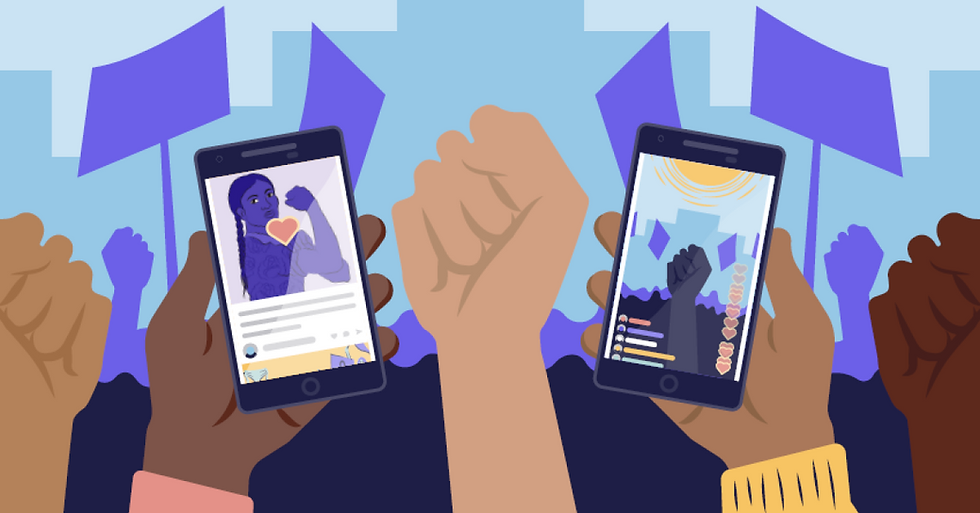The Impact of Social Media on Women's Rights
- asociatia feminaforță
- Mar 3
- 3 min read
Social media has become an inseparable part of modern life. Platforms such as Facebook, Twitter, Instagram, and others have evolved beyond being mere communication tools to become powerful agents that shape societal events, spread news quickly, and accelerate social change. The women's rights movement has effectively utilized the power of social media to reach wider audiences. However, the impact of social media on women's rights has both positive and negative aspects. In this article, we will explore in more depth how social media has influenced women's rights.
1. The Role of Social Media in Spreading the Women's Rights Movement
Social media provides a significant opportunity for women's rights advocates to amplify their voices. Issues such as gender inequality, violence, and discrimination against women have become more visible on social media platforms, raising awareness about these problems. One of the most notable examples of this is the #MeToo movement, which gained global traction and allowed women to share their experiences of abuse and harassment. Social media made it possible for millions of women to unite around a common cause and challenge systemic gender-based violence. Through hashtags, videos, and viral posts, the movement grew, showing how collective voices can shift public discourse and bring attention to crucial social issues.
2. Creating Safe Spaces and Support Networks
Another key impact of social media on women's rights is the creation of virtual spaces for support, solidarity, and empowerment. Women who may feel isolated or marginalized in their local communities can connect with others facing similar struggles through online platforms. Whether it's sharing personal stories, offering advice, or seeking solidarity, social media enables women to build virtual communities that help them navigate their challenges. For example, platforms like Facebook groups, Twitter threads, and Instagram hashtags offer women a space to discuss topics such as mental health, sexual harassment, workplace discrimination, and more. These digital networks can provide emotional support and resources for those in need, helping women feel less alone and more empowered in their fight for equality.
3. Challenges and Backlash on Social Media
While social media has undoubtedly provided women with a platform to advocate for their rights, it has also introduced challenges and risks. One of the most significant concerns is online harassment and cyberbullying. Women who speak out about their rights or criticize patriarchal systems often face aggressive backlash, trolling, and threats of violence. The anonymity of the internet can embolden perpetrators of harassment, making it harder for women to feel safe while sharing their opinions. In some cases, women who take part in feminist movements or challenge traditional gender roles are subjected to online abuse, which can have a detrimental impact on their mental health and overall well-being.
Furthermore, social media can sometimes reinforce harmful stereotypes. While platforms like Instagram promote empowerment and body positivity, they also contribute to unrealistic beauty standards, which can negatively impact women's self-esteem. Filters and curated content often depict an idealized version of reality, which can lead to pressure on women to conform to narrow societal expectations. This paradox highlights the complexities of social media in the context of women's rights, where empowerment and objectification can coexist.
Social media has undoubtedly played a transformative role in advancing the women's rights movement. It has provided a platform for raising awareness, creating supportive networks, and mobilizing global campaigns that challenge gender inequality. However, it is essential to recognize the challenges that come with this powerful tool. As we continue to navigate the digital world, it is crucial to foster a safe and inclusive online environment for women while addressing the risks and negative consequences that come with it.
Social media has proven that it can be a double-edged sword, offering both opportunities and obstacles. By using these platforms responsibly, advocating for better digital policies, and empowering women to speak out without fear of retaliation, we can continue to use social media as a force for positive change in the fight for women's rights.





Comments